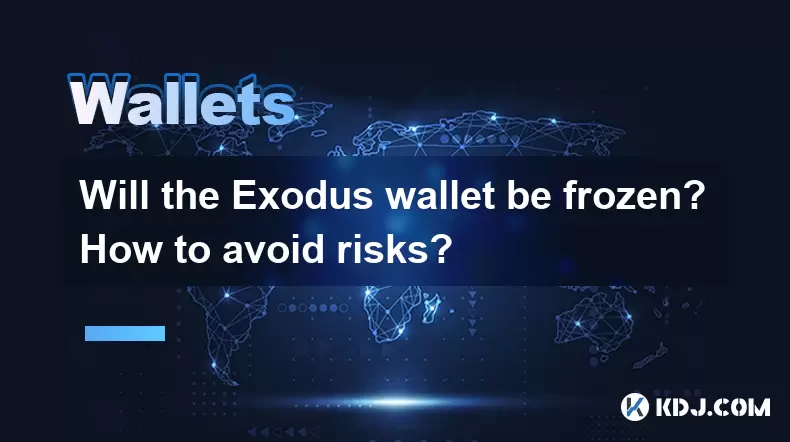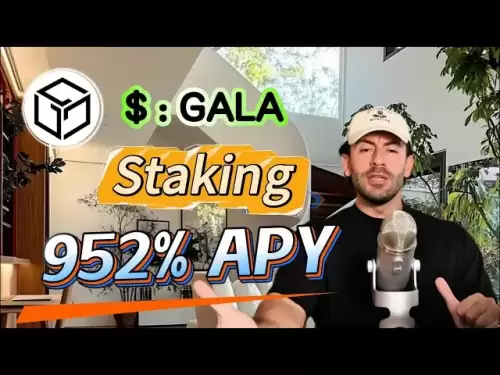-
 Bitcoin
Bitcoin $114500
-0.31% -
 Ethereum
Ethereum $3648
1.11% -
 XRP
XRP $3.033
-0.27% -
 Tether USDt
Tether USDt $0.9999
-0.01% -
 BNB
BNB $758.5
-0.32% -
 Solana
Solana $167.5
1.48% -
 USDC
USDC $0.9998
-0.02% -
 TRON
TRON $0.3331
0.74% -
 Dogecoin
Dogecoin $0.2039
0.25% -
 Cardano
Cardano $0.7419
-0.46% -
 Hyperliquid
Hyperliquid $39.21
2.66% -
 Stellar
Stellar $0.4049
-1.95% -
 Sui
Sui $3.483
-0.56% -
 Bitcoin Cash
Bitcoin Cash $570.8
2.89% -
 Chainlink
Chainlink $16.67
-0.57% -
 Hedera
Hedera $0.2470
-1.57% -
 Ethena USDe
Ethena USDe $1.001
0.00% -
 Avalanche
Avalanche $22.36
1.52% -
 Litecoin
Litecoin $123.4
4.35% -
 UNUS SED LEO
UNUS SED LEO $8.989
0.09% -
 Toncoin
Toncoin $3.324
-2.40% -
 Shiba Inu
Shiba Inu $0.00001219
-1.30% -
 Uniswap
Uniswap $9.811
2.54% -
 Polkadot
Polkadot $3.662
-0.07% -
 Monero
Monero $295.5
-3.85% -
 Dai
Dai $1.000
0.01% -
 Bitget Token
Bitget Token $4.345
0.24% -
 Cronos
Cronos $0.1380
0.95% -
 Pepe
Pepe $0.00001044
-1.14% -
 Ethena
Ethena $0.5981
-4.24%
Will the Exodus wallet be frozen? How to avoid risks?
Exodus wallet, being non-custodial, can't be frozen by external parties, but users must secure private keys to prevent fund loss due to phishing or malware.
May 12, 2025 at 01:21 am

Understanding the Exodus Wallet
The Exodus wallet is a popular cryptocurrency wallet known for its user-friendly interface and support for multiple cryptocurrencies. It allows users to store, send, and receive various digital assets. Given its widespread use, concerns about the security and potential freezing of such wallets are common among users.
What Does It Mean for a Wallet to Be Frozen?
When a wallet is frozen, it means that the wallet's funds are inaccessible to the owner. This can happen for several reasons, such as regulatory actions, security breaches, or legal issues. In the context of cryptocurrency, a frozen wallet might be a result of anti-money laundering (AML) and know-your-customer (KYC) compliance measures enforced by exchanges or regulatory bodies.
Can the Exodus Wallet Be Frozen?
The Exodus wallet itself cannot be frozen by external parties because it is a non-custodial wallet. This means that Exodus does not hold your private keys; you do. As a result, no third party, including Exodus, can access or freeze your funds. However, there are scenarios where your funds within the wallet might become inaccessible, such as if you lose your private keys or if the assets you hold are frozen by a regulatory body.
Risks Associated with Using the Exodus Wallet
While the Exodus wallet is designed to be secure, there are still risks that users should be aware of:
- Phishing Attacks: Scammers may try to trick you into revealing your private keys or seed phrase.
- Malware: Malicious software can compromise your device and steal your wallet information.
- Loss of Private Keys: If you lose your private keys, you will lose access to your funds permanently.
- Regulatory Risks: If the cryptocurrencies you hold are subject to regulatory actions, those assets might become frozen, even if the wallet itself is not.
How to Avoid Risks When Using the Exodus Wallet
To minimize the risks associated with using the Exodus wallet, follow these detailed steps:
Secure Your Private Keys and Seed Phrase:
- When you first set up your Exodus wallet, you will be given a seed phrase. Write this down and store it in a secure location, such as a safe or a secure note-taking app with strong encryption.
- Never share your seed phrase or private keys with anyone. Treat them as you would treat your bank account details.
Use Strong Passwords:
- Set a strong, unique password for your Exodus wallet. Use a combination of letters, numbers, and special characters.
- Consider using a password manager to generate and store complex passwords securely.
Enable Two-Factor Authentication (2FA):
- If available, enable 2FA on your Exodus wallet. This adds an extra layer of security by requiring a second form of verification, such as a code sent to your mobile device.
Keep Your Software Updated:
- Regularly update the Exodus wallet software to ensure you have the latest security patches and features.
- Also, keep your operating system and other software up to date to protect against vulnerabilities.
Be Wary of Phishing Attempts:
- Always access the Exodus wallet from the official website or app store. Be cautious of emails or messages asking for your wallet information.
- Verify the authenticity of any communication purporting to be from Exodus.
Use a Secure Internet Connection:
- Avoid accessing your wallet over public Wi-Fi. Use a secure, private internet connection to minimize the risk of data interception.
Monitor Your Transactions:
- Regularly check your wallet's transaction history to detect any unauthorized activity early.
- Set up transaction alerts if possible, to be notified of any movements in your wallet.
Diversify Your Holdings:
- Do not keep all your cryptocurrencies in one wallet. Consider using multiple wallets and even hardware wallets for added security.
- Diversify your assets across different cryptocurrencies to mitigate the risk of regulatory actions affecting a single asset.
Educate Yourself:
- Stay informed about the latest security practices and potential threats in the cryptocurrency space.
- Participate in forums and communities to learn from other users' experiences and best practices.
What to Do If Your Wallet Is Compromised
If you suspect that your Exodus wallet has been compromised, take immediate action:
- Disconnect from the Internet: Immediately disconnect your device from the internet to prevent further unauthorized access.
- Change Your Password: If you can still access your wallet, change your password immediately.
- Restore Your Wallet: Use your seed phrase to restore your wallet on a new, secure device.
- Report the Incident: Contact Exodus support and report the incident. They may be able to provide additional guidance or assistance.
- Monitor Your Accounts: Keep a close eye on your wallet and other accounts for any suspicious activity.
Frequently Asked Questions
Q: Can Exodus access my private keys?
A: No, Exodus is a non-custodial wallet, which means it does not have access to your private keys. You are solely responsible for managing and securing your keys.
Q: What should I do if I lose my seed phrase?
A: If you lose your seed phrase, you will lose access to your funds permanently. It is crucial to store your seed phrase in a secure location and never share it with anyone.
Q: Is it safe to use Exodus on a mobile device?
A: Yes, it is safe to use Exodus on a mobile device as long as you follow best security practices, such as using a strong password, enabling 2FA, and keeping your device and the app updated.
Q: Can I recover my funds if my wallet is frozen due to regulatory actions?
A: If your funds are frozen due to regulatory actions, it depends on the specific circumstances and the regulatory body involved. In some cases, you may be able to recover your funds by complying with the regulatory requirements, but this is not guaranteed.
Disclaimer:info@kdj.com
The information provided is not trading advice. kdj.com does not assume any responsibility for any investments made based on the information provided in this article. Cryptocurrencies are highly volatile and it is highly recommended that you invest with caution after thorough research!
If you believe that the content used on this website infringes your copyright, please contact us immediately (info@kdj.com) and we will delete it promptly.
- Uniswap Valuation Under the Microscope: Bitwise CIO's Perspective
- 2025-08-05 23:10:12
- Coinbase's $2 Billion Convertible Notes: A Bold Move or Risky Bet?
- 2025-08-05 23:10:12
- Inveniam, MANTRA, and Real-World Assets: Forging a New DeFi Frontier
- 2025-08-05 22:30:12
- Cyprus Investor's $448K Crypto Loss: An Email Hack Wake-Up Call for Crypto Exchanges
- 2025-08-05 22:30:12
- Solana Memecoin Mania: Trader Profit Secrets Revealed!
- 2025-08-05 20:30:13
- POL Price Rebound: Will Consolidation Lead to a Breakout?
- 2025-08-05 20:30:13
Related knowledge

How to add TRC20 token to Trust Wallet?
Aug 04,2025 at 11:35am
Understanding TRC20 and Trust Wallet CompatibilityTrust Wallet is a widely used cryptocurrency wallet that supports multiple blockchain networks, incl...

What is a watch-only wallet in Trust Wallet?
Aug 02,2025 at 03:36am
Understanding the Concept of a Watch-Only WalletA watch-only wallet in Trust Wallet allows users to monitor a cryptocurrency address without having ac...

Why can't I connect my Trust Wallet to a DApp?
Aug 04,2025 at 12:00pm
Understanding DApp Connectivity and Trust WalletConnecting your Trust Wallet to a decentralized application (DApp) is a common process in the cryptocu...

How to fix a stuck pending transaction in Trust Wallet?
Aug 03,2025 at 06:14am
Understanding Why Transactions Get Stuck in Trust WalletWhen using Trust Wallet, users may occasionally encounter a pending transaction that appears t...

What is a multi-coin wallet in Trust Wallet?
Aug 03,2025 at 04:43am
Understanding Multi-Coin Wallets in Trust WalletA multi-coin wallet in Trust Wallet refers to a digital wallet that supports multiple cryptocurrencies...

How to switch between networks in Trust Wallet?
Aug 02,2025 at 12:36pm
Understanding Network Switching in Trust WalletSwitching between networks in Trust Wallet allows users to manage assets across different blockchains s...

How to add TRC20 token to Trust Wallet?
Aug 04,2025 at 11:35am
Understanding TRC20 and Trust Wallet CompatibilityTrust Wallet is a widely used cryptocurrency wallet that supports multiple blockchain networks, incl...

What is a watch-only wallet in Trust Wallet?
Aug 02,2025 at 03:36am
Understanding the Concept of a Watch-Only WalletA watch-only wallet in Trust Wallet allows users to monitor a cryptocurrency address without having ac...

Why can't I connect my Trust Wallet to a DApp?
Aug 04,2025 at 12:00pm
Understanding DApp Connectivity and Trust WalletConnecting your Trust Wallet to a decentralized application (DApp) is a common process in the cryptocu...

How to fix a stuck pending transaction in Trust Wallet?
Aug 03,2025 at 06:14am
Understanding Why Transactions Get Stuck in Trust WalletWhen using Trust Wallet, users may occasionally encounter a pending transaction that appears t...

What is a multi-coin wallet in Trust Wallet?
Aug 03,2025 at 04:43am
Understanding Multi-Coin Wallets in Trust WalletA multi-coin wallet in Trust Wallet refers to a digital wallet that supports multiple cryptocurrencies...

How to switch between networks in Trust Wallet?
Aug 02,2025 at 12:36pm
Understanding Network Switching in Trust WalletSwitching between networks in Trust Wallet allows users to manage assets across different blockchains s...
See all articles

























































































